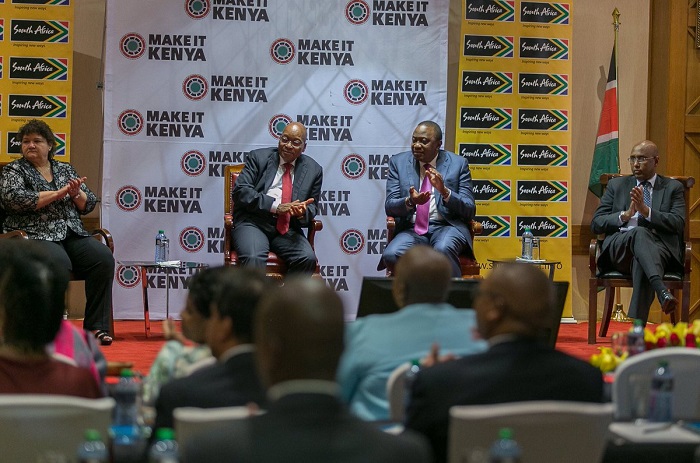
Nairobi, Kenya | AFP |
South Africa and Kenya vowed Tuesday to “soften borders” between the two regional powerhouses by easing trade and visa barriers, part of ongoing efforts to boost low levels of commerce within Africa.
While both nations are economic giants in their respective regions, South Africa’s Jacob Zuma on Tuesday made the first-ever state visit by a president from his country to Kenya.
He and Kenyan President Uhuru Kenyatta said in a joint statement there was “immense untapped potential to expand, both in value and volume terms, the scale of the two countries’ commercial relations.
“The leaders agreed to progressively remove all barriers to trade between the two countries.”
Kenyatta tackled issues of high levies on tea exports from Kenya — one of the world’s top producers of the beverage — as well as restrictions against other products.
The leaders also discussed efforts to make it easier for Kenyans to travel to and work in South Africa, with Zuma agreeing to speed up plans to decrease the cost of visas and do away with transit visas.
Zuma said the visit came as part of “the broader agenda of the AU (African Union) to soften the borders in the continent so we could enhance intra-trade.
“Without intra-trade we have realised we cannot develop as a continent. All other … continents are able to thrive because there is quick movement of goods and people.”
President Jacob Zuma and President Uhuru Kenyatta observe the signing of agreements during his State Visit to Kenya. pic.twitter.com/yYoJbcWaEj
— PresidencyZA (@PresidencyZA) October 11, 2016
According to a study released in 2015 by the United Nations Economic Commission for Africa (UNECA) trade within Africa stands at around 14 percent, while trade between African countries and the rest of the world is at 86 percent.
This figure has remained roughly steady for the past decade, despite repeated pledges from the AU to remove obstacles to regional trade.
Bureaucracy, exorbitant customs fees, poor transport systems and a lack of infrastructure are all cited by observers as blockages to improved trade on the continent.
Within Europe, North America and Asia trade stands at around 60 percent, 40 percent and 30 percent respectively, according to the African Union.
However Kenya and South Africa are far from the continent’s worst performers and trade between the two is worth 500 million euro ($550 million).
South Africa is Kenya’s fourth source of imports, and over 60 South African companies operate in Kenya.
Zuma and Kenyatta also agreed to increase intelligence sharing in the fight against terrorism, and to work together to stabilise countries where terrorism takes root because there is no stable government, such as Somalia.
Kenya also asked South Africa to support its nomination of Foreign Minister Amina Mohamed to take over from Nkosazana Dlamini-Zuma — Zuma’s ex-wife — as chairwoman of the AU
 The Independent Uganda: You get the Truth we Pay the Price
The Independent Uganda: You get the Truth we Pay the Price





